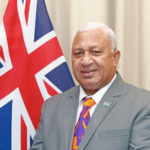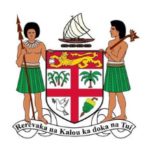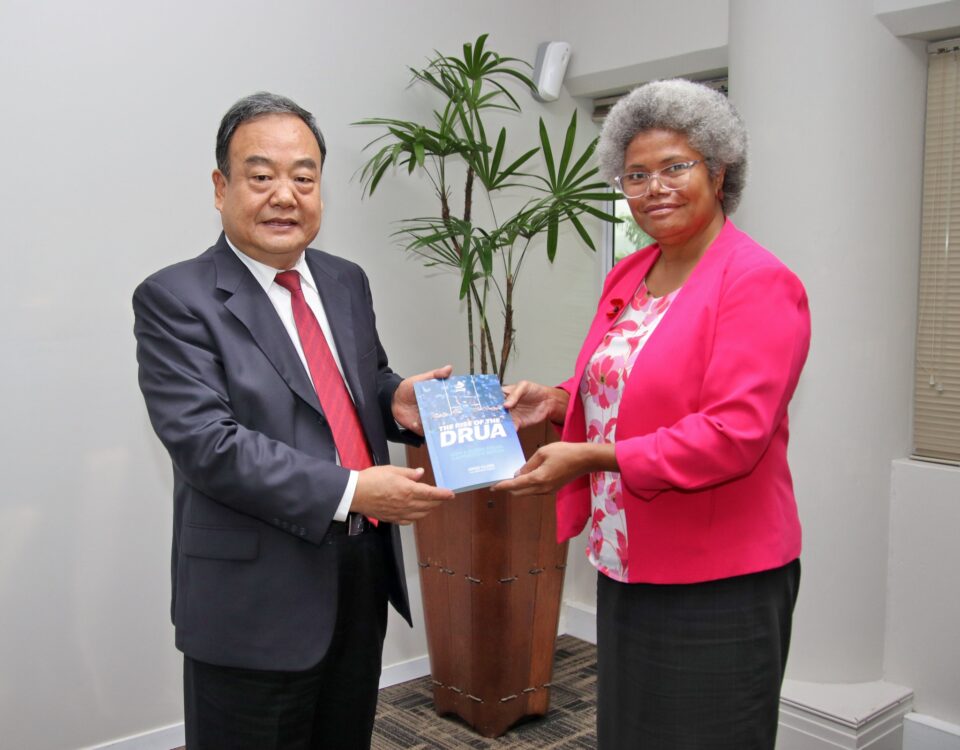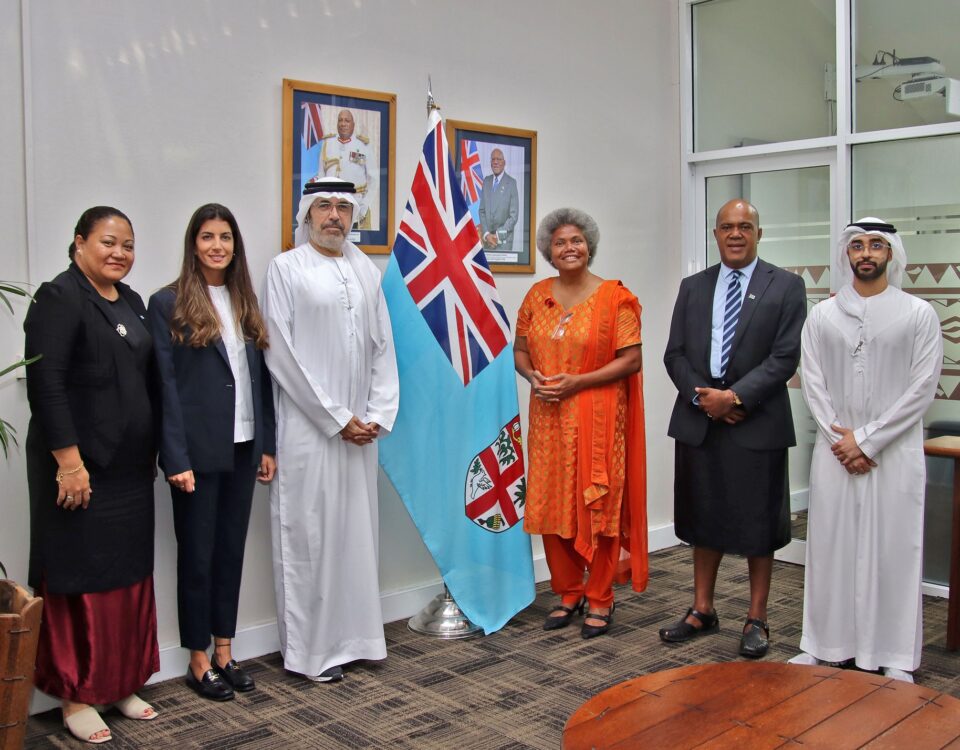
Prime Minister Bainimarama leads the Pacific to Washington DC; Will hold first official meeting with The President of the United States in 38 years
27/09/2022
PRIME MINISTER HON. VOREQE BAINIMARAMA’S OPENING REMARKS AS THE CHAIR OF PIF AT THE U.S. – PACIFIC ECONOMIC AND TRADE TIES
27/09/2022Published On: 27/09/2022
Secretary,
Excellencies,
Ladies and Gentlemen,
For Fiji, this panel encapsulates the hope, change, and long overdue urgency that Biden Administration has brought to the climate challenge. I was the first leader to congratulate President Biden on his successful election and we are relieved to see the US trying to regain its temporarily abandoned mantle of climate leadership, both domestically with the climate components of the Inflation Reduction Act and internationally, with the US’s return to the Paris Agreement and renewed commitments to effective and scalable climate finance.
The Pacific’s greatest concern is not geopolitics or power politics–– it is climate change, pure and simple. We simply have not been able engage in good faith with USA without America taking its rightful at the helm of the global climate action campaign. Any backwards steps, now or in the years to come, will be a step away from America’s place in the Pacific.
With time fast running out, we need urgency and ambition. Since 2016, the 14 Pacific SIDs have received $500 million of all available climate finance. That is zero-point six percent of the global climate finance and a negligible compared to the existential climate threat. We ask the Biden Administration to help us meet four priorities:
One, In Sharm El Shek, meaningfully help us advance the dialogue on Loss and Damage and establish a dedicated funding mechanism to support it.
Two, with your developed country counterparts, deliver on the USD 100 billion climate finance pledge, and commit to $750 billion in the post-2025 financing framework, with at least 5% reserved for the Pacific SIDS.
Three, through USAID and your leadership on the GCF and other climate funds, fund and scale our efforts to link climate action and economic development. We have miles and miles of seawalls that we need to build, over 40 communities we need to relocate, and a network of national infrastructure to make more climate resilient. With my fellow Pacific leaders, we are trying to decarbonize regional and domestic shipping. This would protect our oceans and vital fishing ecosystems, revolutionize our infrastructure to fit the 21st Century, and transform our regional connectivity. Our recently launched National Climate Finance Strategy includes specific climate-related projects across every sector of our economy, from human health and gender to agriculture and energy. They all need the technological, technical, and financial expertise the US can provide.
And finally, through your leadership at the MDBs, including the IMF, push for structural reforms to the outdated financial frameworks that further punish us for climate events and don’t help us finance much needed climate investments. These reforms include a more holistic assessment of GDP, and the debt-to-GDP ratio, that incorporates a country’s climate vulnerabilities, efforts to address the challenge, and climate-related debt. It includes debt-for-nature swaps that help us invest in ambitious climate adaptation without risking our debt sustainability.
Secretary, we also hope to work with you in shaping new partnerships between our government agencies, between our universities to build the necessary human resource base that is needed for the Pacific to take charge of designing, implementing its own climate and oceans programs. Let’s get after this work in earnest – we have ground to make up, innovation to deploy and communities we can save.
For Fiji, this panel encapsulates the hope, change, and long overdue urgency that Biden Administration has brought to the climate challenge. I was the first leader to congratulate President Biden on his successful election and we are relieved to see the US trying to regain its temporarily abandoned mantle of climate leadership, both domestically with the climate components of the Inflation Reduction Act and internationally, with the US’s return to the Paris Agreement and renewed commitments to effective and scalable climate finance.
The Pacific’s greatest concern is not geopolitics or power politics–– it is climate change, pure and simple. We simply have not been able engage in good faith with USA without America taking its rightful at the helm of the global climate action campaign. Any backwards steps, now or in the years to come, will be a step away from America’s place in the Pacific.
With time fast running out, we need urgency and ambition. Since 2016, the 14 Pacific SIDs have received $500 million of all available climate finance. That is zero-point six percent of the global climate finance and a negligible compared to the existential climate threat. We ask the Biden Administration to help us meet four priorities:
One, In Sharm El Shek, meaningfully help us advance the dialogue on Loss and Damage and establish a dedicated funding mechanism to support it.
Two, with your developed country counterparts, deliver on the USD 100 billion climate finance pledge, and commit to $750 billion in the post-2025 financing framework, with at least 5% reserved for the Pacific SIDS.
Three, through USAID and your leadership on the GCF and other climate funds, fund and scale our efforts to link climate action and economic development. We have miles and miles of seawalls that we need to build, over 40 communities we need to relocate, and a network of national infrastructure to make more climate resilient. With my fellow Pacific leaders, we are trying to decarbonize regional and domestic shipping. This would protect our oceans and vital fishing ecosystems, revolutionize our infrastructure to fit the 21st Century, and transform our regional connectivity. Our recently launched National Climate Finance Strategy includes specific climate-related projects across every sector of our economy, from human health and gender to agriculture and energy. They all need the technological, technical, and financial expertise the US can provide.
And finally, through your leadership at the MDBs, including the IMF, push for structural reforms to the outdated financial frameworks that further punish us for climate events and don’t help us finance much needed climate investments. These reforms include a more holistic assessment of GDP, and the debt-to-GDP ratio, that incorporates a country’s climate vulnerabilities, efforts to address the challenge, and climate-related debt. It includes debt-for-nature swaps that help us invest in ambitious climate adaptation without risking our debt sustainability.
Secretary, we also hope to work with you in shaping new partnerships between our government agencies, between our universities to build the necessary human resource base that is needed for the Pacific to take charge of designing, implementing its own climate and oceans programs. Let’s get after this work in earnest – we have ground to make up, innovation to deploy and communities we can save.





